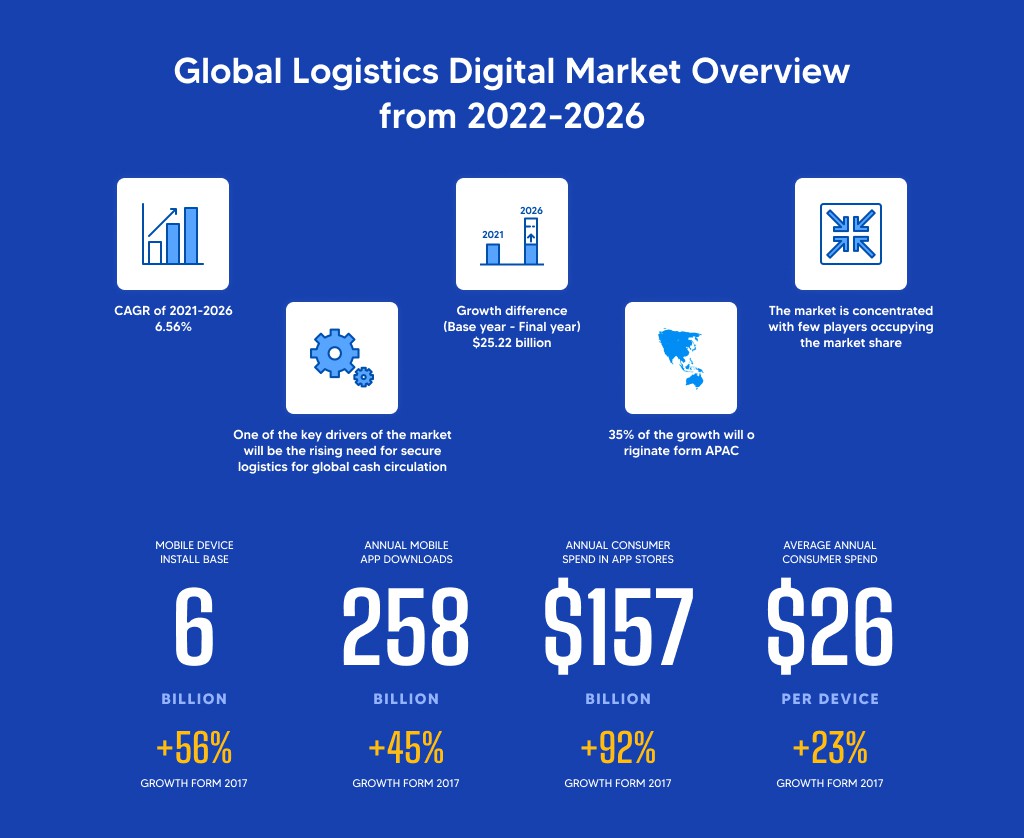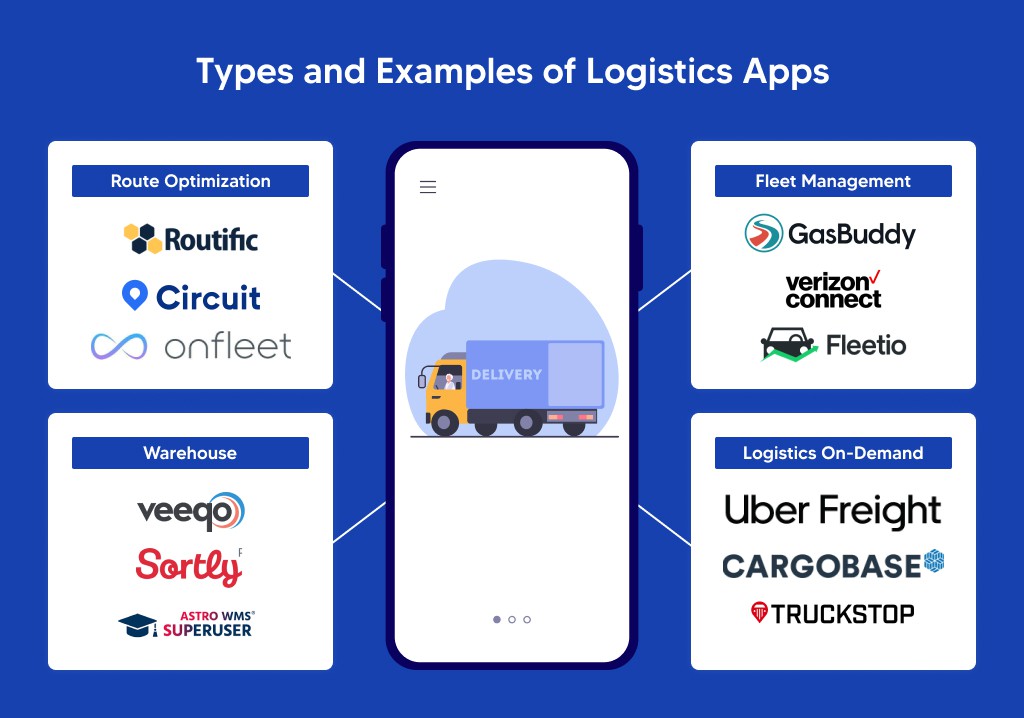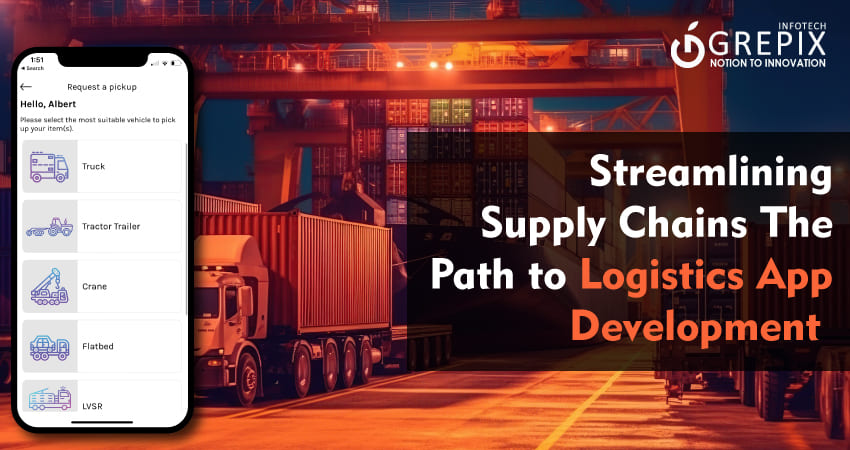Streamlining Supply Chains: The Path to Logistics App Development
In an age where efficiency and speed are paramount, logistics companies are turning to technology to optimize their operations. One such technological advancement is the development of logistics apps. These apps are revolutionizing the way logistics companies manage their supply chains and are becoming an integral part of the industry's success.
As of now, several industries, including eCommerce, mining, building, and infrastructure development, deal with the transportation of commodities and raw materials.
In 2020, the heavy-duty vehicle market is expected to be worth $350 billion. Between 2021 and 2027, the market will expand at a CAGR of more than 4%.

Market Overview of the Digital Logistics Market Expensive truck ownership and maintenance, regular truck wear and tear, fleet management, warehouse management, and route optimization all have an impact on the logistics industry. Logistics app development can assist firms in dealing with the aforementioned difficulties.
A logistics application is a comprehensive solution that assists businesses in managing all aspects of their logistics operations, such as their fleet, routes, drivers, items, shipping data, and so on.
This logistics app development guide will teach you how to create a logistics solution adapted to your business needs to increase business efficiency and gain greater control over transportation and delivery operations.
Logistics app development encompasses a wide range of applications designed to improve various aspects of the supply chain and transportation processes. Here are some common types of logistics apps:
Discover how logistics app development is streamlining supply chains and revolutionizing the transportation and delivery industries. This blog post explores the key challenges faced by logistics businesses and how mobile apps are providing innovative solutions. From real-time tracking to route optimization, learn how logistics apps are enhancing efficiency and customer satisfaction in the ever-evolving supply chain landscape.
1. Warehouse Management Apps
These apps help manage and optimize warehouse operations, including inventory management, order picking, and storage. They often include features for barcode scanning, order tracking, and real-time inventory updates.
2. Transportation Management Apps
These apps focus on optimizing transportation and fleet management. They help with route planning, load optimization, vehicle tracking, and scheduling deliveries. They are vital for logistics companies with a fleet of vehicles.
3. Order and Inventory Tracking Apps
These apps allow businesses and customers to track the status and location of orders and shipments in real-time. They provide visibility into the entire supply chain, from order placement to final delivery.
4. Last-Mile Delivery Apps
Last-mile delivery is often the most critical and challenging part of the logistics process. Last-mile delivery apps assist with route optimization, ePOD capture, and efficient delivery management, improving delivery accuracy and customer satisfaction.
5. Fleet Maintenance Apps
Fleet maintenance apps help manage the maintenance schedules and records for vehicles. They track vehicle performance, schedule routine maintenance, and address issues promptly, reducing downtime.
6. Inventory Forecasting and Demand Planning Apps
These apps use data analytics to predict demand and help businesses plan their inventory accordingly. They reduce overstocking and understocking issues and optimize supply chain efficiency.
7. Supplier and Vendor Management Apps
These apps help businesses manage their relationships with suppliers and vendors. They may include features like order placement, performance tracking, and communication tools to ensure a smooth supply chain.
8. Route Optimization Apps
Route optimization apps focus on finding the most efficient routes for delivery vehicles. They consider factors like traffic conditions, road closures, and delivery time windows to reduce fuel consumption and improve delivery times.
9. Real-Time Communication and Collaboration Apps
These apps enhance communication and collaboration among various stakeholders in the supply chain, such as shippers, carriers, and customers. They enable real-time communication, document sharing, and coordination.
Each type of logistics app addresses specific challenges and requirements within the logistics industry, and their development can significantly improve the efficiency, transparency, and competitiveness of logistics operations. The choice of the app type depends on the specific needs and goals of a logistics business.

Benefits of Logistics Apps Development
Route optimization apps focus on finding the most efficient routes for delivery vehicles. They consider factors like traffic conditions, road closures, and delivery time windows to reduce fuel consumption and improve delivery times.
1. Real-time Visibility
Modern logistics demands real-time tracking and monitoring of shipments. Apps provide real-time updates on shipment status, location, and estimated delivery times, enabling companies to make informed decisions.
2. Efficiency and Automation
Logistics apps automate several manual processes, reducing human errors and enhancing efficiency. This includes order processing, route optimization, and inventory management.
3. Customer Expectations
In the age of e-commerce, customers expect transparency and timely deliveries. Logistics apps enable companies to meet these expectations, ultimately improving customer satisfaction.
4. Cost Reduction
By optimizing routes, reducing fuel consumption, and improving resource allocation, logistics apps can significantly cut costs.
5. Data-Driven Decision-Making
Logistics apps generate valuable data that can be analyzed to make informed decisions, further enhancing the supply chain's efficiency.
Also Read: How To Become A Successful Taxi Booking Company In Nigeria
Key Features of a Logistics App
Logistics apps are versatile, catering to various industry needs. Here are some core features that an ideal logistics app should possess:
- Shipment Tracking: Real-time tracking of shipments with GPS integration.
- Inventory Management: Monitoring and controlling inventory levels.
- Route Optimization: Finding the most efficient routes to minimize fuel costs and delivery times.
- Order Processing: Automating order placement and processing.
- Electronic Proof of Delivery (ePOD): Capturing digital signatures and other delivery proof.
- Data Analytics: Collecting and analyzing data for better decision-making.
- Notifications and Alerts: Sending updates and alerts to both customers and logistics managers.
- Integration: Seamless integration with existing software and hardware systems.
The Development Process of Logistics App Development
Developing a logistics app involves several stages, from ideation to deployment. Here's a simplified overview of the process:
- Define Objectives: Clearly define the objectives of the app. What problems will it solve, and what benefits will it bring to the logistics company?
- Market Research: Study the competition, identify target users, and understand their needs.
- App Design: Create wireframes and mockups to visualize the app's user interface. Focus on usability and user experience.
- Development: Choose the technology stack and start building the app. This involves coding, testing, and iterating.
- Integration: Ensure the app integrates seamlessly with existing logistics systems, such as ERPs and CRMs.
- Security: Implement robust security measures to protect sensitive data, including customer and shipment information.
- Testing: Thoroughly test the app to identify and fix any bugs or issues.
- User Training: Train logistics personnel and customers on how to use the app effectively.
- Deployment: Launch the app and promote it to your target audience.
- Maintenance and Updates: Continuously improve the app based on user feedback and industry changes.
Conclusion
Logistics app development is a transformative journey for logistics companies. By investing in the right technology, they can streamline their operations, cut costs, and improve customer satisfaction. In a rapidly evolving industry, logistics apps are not just an option; they are a necessity for staying competitive and relevant. As the logistics landscape continues to change, Grepix Infotech can expect even more innovations in the field of logistics app development.







